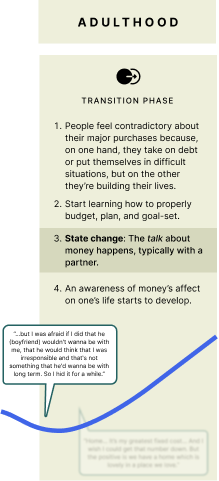Rapid Experimentation: Finding the right path for Money Talkss
A reflection on finding the right way to approach your target users.
Overview
In March 2023, my classmate and I embarked on a project with a shared goal: to explore people's beliefs and values concerning money.
After conducting numerous interviews, we initiated the process of charting people's evolving relationships with money across different stages of life.
Finding a pattern
As we spoke with people and begin mapping out their relationships with money, we saw a trend. When people reach adulthood, they go through a transition phase: Being conscious about their financial circumstances.
People had a hard time opening up about money to others, let alone their partners.
When we dived deeper into the subject, we discovered that the root cause of this difficulty stemmed from a deficiency in certain key skills. These skills, we found, were often lacking due to emotional, educational, or upbringing challenges.
This discovery led us to realize there was something to be solved around helping couples talk about money.
Solving it the right way
We now knew what the goal of our product was, but we faced the challenge on how to do it. We ideated and iterated several times during Q3 until we found what worked best for our participants.
A fun, light-hearted way that can help couples talk about difficult subjects such as money.
Experiment 1: Fake Door Experiment
We built a landing page, where we described the solution and added a Wait List section, assuming users would be interested enough to sign up and try it out.
Our success criteria was that out of all traffic, we would have 10% of it sign-up.
Shared across dating subreddits, finance oriented communities and social media.
We saw low engagement and started iterating upon it, so it felt almost as if we were doing SEO and optimizing a landing page.
It failed, out of 329 unique visits, we got only 1 sign up.
What we learned
When we had this experiment live, we spent a big chunk of time iterating and optimizing it, so it almost felt as if we were doing SEO and Marketing to improve conversion. Looking back this time would’ve been better spent doing other experiments.
Experiment 2: Usability testing
We went back to basics, decided to just focus on the game experience, created 5 questions around Abundance, a financially related topic that can have some nuances as we’ll see later.
For our participants, we focused on couples that were dating for less than 2 years.
Reaching out to the awesome AC4D community, friends and family, we were able to set up 5 sessions in a few days. Mind, this sessions required to have both partners on the same time slot, so scheduling was a bit hard, but thankfully we were able to make it work. Testing was both in-person and remote, across the US and Peru.
What we tested?
As I mentioned earlier, we decided to focus our first iteration of the game on Abundance, so we created a set of cards that started light, had a peak depth question and a prompt to ease the couple out of it.
This is what the game looked like, for both physical and digital.
What we learned?
Couples wanted a way to choose the depth of the questions, so if they’re looking to have a casual or a more serious conversation they would like the option to choose.
Also, we saw Abundance not being interpreted solely as a money related subject, but rather, as what they wanted Abundance to be, for some was money, for others, time and love.
I was surprised to see couples gaze into each other while asking questions but also after answering them. I believe the questions we provided were strong enough to increase that interest when couples were sharing stories to one another.
What’s next
As we reach our final presentation, we want to broaden the set of questions to do some further questions, and also, provide some sort of control on the depth of the conversation, so couples know what they’ll be facing when they start playing.
Looking back
I takeaway the fact of being conscious with time when rapid experimenting. Not marrying the idea as we did with our landing page.
And also, a note to myself: Don’t be afraid of trying! Feel comfortable with failure, as long as you action upon it, you will always learn something, I think that can be applied to my whole AC4D experience, no matter how tough things can get, try to get the most out of it. As long as you learn and iterate, you’ll find the right path, always.




